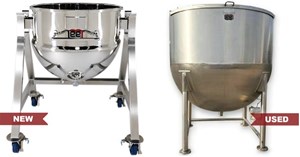Sign up to be notified of our new blog posts.
Thinking Used Instead of New? Take These Essential Steps Before Buying a Pre-Owned Vessel
Posted on May 21, 2025

Summary: A normal response in uncertain economic climates is to put capital budgets under tighter scrutiny. For many manufacturers, that is their current reality, which means for those needing to expand production capacity or replace aging equipment, exploring used equipment options might become an important part of their consideration process.
Used vessels can offer attractive benefits: primarily shorter lead times and reduced upfront costs. But as with any significant equipment investment, buying used comes with risks and unknowns that you need to carefully manage.
If you’re considering going the pre-owned route, follow these guidelines to be certain you’re making the best choice:
1) Understand the Vessel’s Original Use
Knowing what was previously processed in the kettle isn’t just a nice-to-know—it’s a critical safety and compliance issue. If the unit was used for chemicals, pharmaceuticals, or other non-food applications, there may be a risk of contamination, even with thorough cleaning.
Unfortunately, due to confidentiality agreements and a lack of records, it’s often impossible to get the full chain of custody for a used kettle. Unless the seller can provide detailed documentation of its history, you’ll need to weigh the potential liabilities carefully.
2) Verify the Vessel’s Inspection and Repair History
Processing kettles with steam or water jackets are classified as “unfired pressure vessels” under the A.S.M.E. Code, meaning any repairs or alterations must be performed and documented by certified professionals. Specifically, only a certified A.S.M.E. technician can make repairs, and these must be inspected and approved with an “R stamp” from a certified inspector.
When reviewing a used kettle, ensure there’s a clear, complete record of inspections and certified repairs. If repairs were done under the radar, without certification, it’s best to walk away—your safety, liability, and compliance could all be at stake.
3) Consider the Fit to Your Current and Future Production Needs
Many used kettles were originally custom-built, which means their design and functionality may not align with your production requirements. Seemingly small limitations—like agitator type, discharge size, or heating capacity—can require costly retrofits.
In some cases, the cost of modifying a used kettle or tank to fit your needs may approach or even exceed the price of a new unit built to spec. Be realistic about how well the vessel aligns with your production goals, now and into the future.
4) Account for Preventive Maintenance and Spare Parts
Used equipment often comes “as-is”—which includes signs of wear, unknown maintenance gaps, and possibly missing or obsolete parts. You’ll want to perform a thorough inspection and preventive maintenance before introducing it into your production environment.
Also, check whether replacement parts are readily available and whether you have access to technicians familiar with the model. Otherwise, you could be looking at unplanned downtime and repair delays down the road.
5) Understand the Warranty… If There is One
Unlike new kettles—which often come with multi-year warranties—most used units are sold “as is, where is.” Some dealers may offer short-term or limited warranties on reconditioned equipment, but this is the exception, not the rule.
That makes a thorough inspection and upfront maintenance even more essential. Without a safety net, you’re taking on all the risk—so make sure you’re doing your due diligence.
The Bottom Line: Ask the Right Questions
Whether you ultimately buy new or used, success comes down to asking the right questions—and getting clear, confident answers.
At Lee Industries, we support informed decisions. While we’re best known for our custom vessels and agitators, our team offers A.S.M.E.-certified repairs, equipment refinishing, and even full rebuilds for used kettles. We also maintain a deep archive of equipment records dating back to the 1940s. If you're considering a used Lee kettle, we’ll help you understand its performance potential.
Need more insight before you decide? Check out our comprehensive guide:
New or Used Kettle? How to Make the Right Choice for Your Food Processing Operation. Or contact us and one of our Applications Engineers can help you determine the best path for your situation.
Comments
Add Your Own Comment